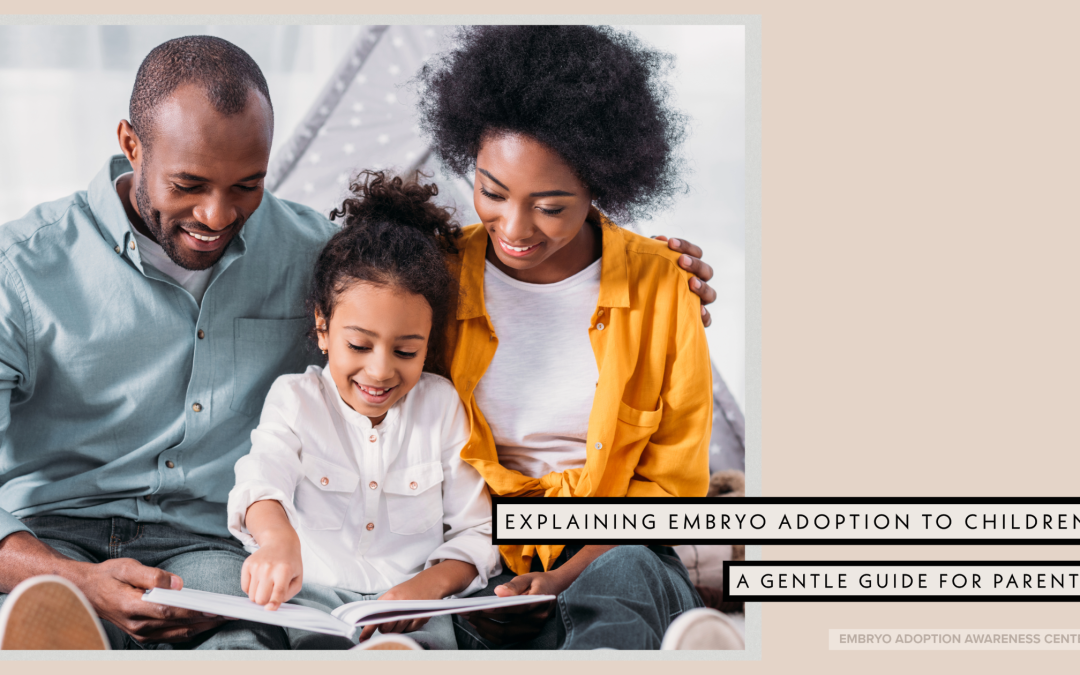Raising a child who was adopted as an embryo or was donor-conceived involves unique and delicate conversations. These discussions, if approached thoughtfully, can foster trust and understanding, helping your child develop a healthy sense of self-identity. Here we present a comprehensive guide on how to navigate this sensitive topic.
Start Early and Use Age-Appropriate Language
Starting the adoption conversation early is crucial. Young children are naturally curious and accepting, making early childhood an ideal time to introduce the concept in ways that they will understand. For a toddler, you might begin with simple phrases like, “Mommy and Daddy needed some help to bring you into our family. A kind person gave us special seeds, and that is how you were born.” This sets a foundation that can be built upon as the child grows.
As your child grows older and their understanding deepens, you can gradually introduce more details. For instance, a preschooler might grasp the idea of a “special helper” with more understanding. You could say, “Some families need a little help to have a baby. We had a special helper who gave us something we needed to make you.”
Normalize the Concept
Normalizing embryo adoption and other forms of donor conception is essential to avoid any feelings of secrecy or “otherness.” Children take cues from their parents’ attitudes, so it is important to approach the topic with positivity, confidence, and normalcy. Incorporate stories about families formed in different ways into your regular reading. Books like The Pea That Was Me by Kimberly Kluger-Bell or Tell Me About the Night I Was Born by Jamie Lee Curtis can be helpful tools.
Discussing different family structures, whether through books, shows, or real-life examples, helps your child understand that families are made in many different ways. Emphasize that what makes a family is love and care, not just genetics.
Be Honest and Open
Honesty is the cornerstone of building trust. As children grow older, they will ask questions that are more detailed. It is important to answer these questions truthfully and to the best of your ability. For example, if a school-aged child asks, “Why did you need help to have me?” you might explain, “Some people’s bodies need help to have a baby, just like how some people need glasses to see better. We needed help, and we were so blessed to receive it.”
At the same time, avoid overwhelming your child with too much information at once. Offer answers that are honest yet appropriate for their developmental level. If you do not know how to answer a question right away, it is okay to say, “That’s a great question! Let me think about the best way to explain it, and we’ll talk about it soon.”
Address Emotional Concerns
As time goes on many children have emotional reactions about their conception. They might wonder about the embryo donor or feel different from their peers. Validate their feelings and reassure them of their importance and place in your family. Statements like, “We wanted you so much, and we’re so happy you’re part of our family,” can reinforce their sense of belonging.
If they express curiosity about the donors, provide age-appropriate information. For instance, you might say, “The donor was a kind person who helped us have you. They wanted to help families like ours.” As they mature, they might have more questions about the donor’s identity or background, which you can address with more detail over time.
Many families are now opting for open adoptions or direct donations with the embryo donors. This would mean it may be possible to direct any questions your child has directly to them!
Seek Support and Resources
You do not have to navigate this journey alone. There are many resources available for families with embryo adopted and donor-conceived children. Support groups, online communities, and individual and family counseling can provide guidance and shared experiences. Connecting with others in similar situations can offer a sense of community and support.
Consider consulting a therapist who specializes in family dynamics and donor conception if you feel uncertain about how to proceed. They can offer strategies tailored to your family’s needs and help you prepare for future conversations.
Explaining donor conception to a child is an ongoing conversation, not a one-time event.
By starting early, using age-appropriate language, normalizing the concept, being honest, addressing emotional concerns, and seeking support, you can foster a trusting and open relationship with your child. The goal is to help them understand their unique origin story in a way that is positive and affirming, ensuring they feel secure and loved within their family.
To learn more about resources available to your family, visit EmbyroAdoption.org.


Recent Comments